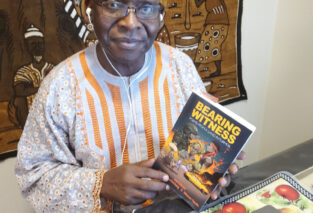(First published in August 2016)
One of the most challenging things you can do is concentrate on reading a book aboard a bus from Douala to Bamenda in Cameroon, especially with the incredibly bad, pothole-ridden roads, and when you are crammed up in what someone has misleadingly labeled a “VIP” bus. What with seats that have been so tightly squeezed together that your knees are literally stuck onto your chest, with the middle passage, that should have been left free, in case of an emergency evacuation, having been taken up by other smaller seats that have been firmly welded into place.
I always wonder what the Japanese builders of some of those buses would say were they to see the ingenious additions some of their buyers make to their original creations; the only purpose being to squeeze in as many passengers as possible so as to make an additional buck, the passenger’s comfort being of little or no interest to the owners. Whenever anyone at the back wants to step out, it is the whole lot ahead who must grudgingly accompany them outside.
Then don’t mention the stench as the overheated bus tumbles in and out of potholes, the worst I have seen in years – and I ply that road on a fairly regular basis. What of the nauseating perfume from the blend of miondo and bobolo and the rich odour of screaming babies’ diapers! Then the roar from passengers who seem to want to rival each other as they scream into their cellphones, not caring who is within earshot!
That was the condition I tried to erase from my mind – with limited success – as I plunged my nose into Imbolo Mbue’s fast-pace novel, Behold the Dreamers. My friend and ICT teacher, Tande Dibussi, had sent me an advance copy of the book before it hit the bookshelves of the world; and from what I could see, it was surely going to do so with a bang, not a whimper.
Beside me sat a woman who, in terms of volume, could have had difficulty occupying our two seats combined. Her left elbow, huge in size, was literally anchored on my chin or on one on my ribs, depending on when she decided to readjust her huge size on her seat, which turned out to be quite frequent. The worse moments came when she would occasionally lift her elbow high in the air, releasing air of unpleasant odour from the folds of her hairy armpits.
Such discomfort notwithstanding, I decided to make the best of a bad situation by resolutely following Jende Jonga, the Limbe-born “hero” of the novel, and his more enterprising and resourceful, no-nonsense wife, Neni, the woman who does not take no for an answer, because once she puts her hand on the legendary plough, she doesn’t look back.
She and Jende had been friends from way yonder. In fact, Jende had managed to pluck her virginity and plant a seed in her womb, an act her father, who considered himself of a higher social status than Jende and his family, didn’t take kindly to heart, and had the young man thrown in jail for four months.
I was engrossed in the book when my neighbor suddenly lunged out and literally snatched the book from my hands, her eyes having caught the author’s picture on the back. How very rude, I thought! I was about to protest when she started screaming, “Cette femme-ci a des cheveux oooohh! Chei!! C’est pas possible! » (What hair this woman has on her head ! This is unbelievable!). The other women suddenly leaned forward and, before long, the book was making the rounds of the bus. Another pointed out to her ear-rings. “Tu vois les boucles d’oreilles là! Je suis sûre qu’elles sont toutes en or! » (She thought Imbolo’s ear-rings, dangling like ripe fruits from her ears, had to be of pure gold). « Et elle a des dents blanches ! My mami-eeh ! Comment elle fait pour avoir des dents blanches comme ça ? » It was now Imbolo’s white teeth someone seemed to stand in awe of, wondering what she did to have them so white.
When I managed to get the book back, I told the boisterous women that the young lady, whose appearance they so admired, was a writer and that that book was the fruit of her intellectual labour. I told them that she was from Limbe and that they too could become writers like her. My neighbor looked at me as if I had just said something unbelievably stupid. “Moi! Ecrire un livre. Que moi je peux même lire!” She wondered loud how she could be expected to write when she could not even read. And the laughter intensified as each talked of how she had dropped out of school for one reason or another, and could not remember when she ever read a book; another said she had only spent a year or so in school and had had to drop out with a protruding belly, the result of not being able to close her thighs. The laughter that followed those colourful stories could have been heard a mile away as the bus stumbled into one huge pothole after another.
As their interest continued to hover around Imbolo’s hair, I told them that beneath that mass of hair – which made her look like the younger version of the Nigerian Nobel-Prize laureate, Wole Soyinka (minus the intense grayish hair and beard), lies a fine writer of great promise. But it was clear that none of them was interested in the book, just in the author’s looks. And besides, stories of the “eating of the forbidden fruit” and below-the-navel activities were already catching everyone’s attention, as attested to by the intense laughter all around me. To say that it is not easy to read under such circumstances, is certainly an understatement.



